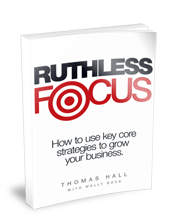Companies with a simple strategy and a ruthless focus on execution and business basics can be successful for a very long time. Atkins and Pearce, for example, was founded in the same year that James Monroe was sworn in as president of the United States.
They’re an exception. Most companies, even big ones, don’t last nearly that long.
In 1955, Fortune Magazine published its first list of the top 500 companies ranked by gross revenue. Today, only eleven of them are still on the list.
The sad truth is that very few of the companies that disappeared succumbed to some irresistible force. Instead, they abandoned the core strategy that brought growth. There are three common reasons why.
They want to grow faster. Chico’s FAS made their own line of clothes that Baby Boomer women wanted to buy. When they focused on that strategy, things went well.
Then they decided they could grow even more by diversifying. They purchased or started businesses that sold undergarments, that sold to younger women, and that sold different styles of clothes.
By 2005, Chico’s wasn’t quite sure what it was doing. CEO Scott Edmonds told analysts that: the company was looking to “clarify our focus.” Within two years the stock that had traded around $50 per share had sunk below $10.
Anything that distracts a successful company from its core mission can create a problem. At Home Depot, the focus shifted to pursuing efficiency with disastrous results.
Between 1986 and 1996, Home Depot delivered forty consecutive quarters of record results. The strategy was simple and based on founder Bernie Marcus’ phrase, “Love the customer.” Home Depot did that by providing vast selection and great service, in part by giving local store managers a lot of autonomy.
But when the board brought in Bob Nardelli as the new CEO, focus shifted to improved operating efficiency. The board expected that shifting from loving the customer to loving the numbers would bring greater profits.
Nardelli delivered on the efficiency. The only problem was that, in the process, he shredded the culture and cast off the people who had made Home Depot successful.
Some companies, like Chico’s or Home Depot, get in trouble when they shift focus from a successful core strategy to something they’re sure will do better. But there are companies that get in trouble for more human reasons.
Sometimes a new CEO wants to make his or her mark. Often, that means abandoning the very things that have worked in the past.
When Ron Allen became CEO of Delta Airlines in 1987, he took the helm of one of the world’s great airlines. Delta was the clear choice of business travelers. It had come through deregulation in better shape than the competition. And it had some of the best employee relations in the industry.
There hadn’t been a strike for almost fifty years. There hadn’t even been a union vote for thirty. And, in 1983, Delta employees actually chipped in to buy the company’s first Boeing 767 as a thank-you to management for their handling of deregulation
Allen changed just about everything. A decade later, the company had gone from being the premier airline for business travel, with great employee morale, and a solid balance sheet, to being just another struggling airline with labor problems.
The lesson seems clear. If you’ve got a strategy that’s working for you, don’t shift your focus to something else.
You’ll find more details on these and other lessons in Ruthless Focus: how to use key core strategies to grow your business.

